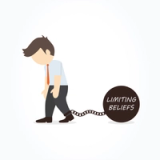12 Dec 2019
Do you have beliefs that are holding you back?
Written by Dennis Stanley

In this post I want to address the subject of our beliefs, I’m not referring to beliefs of the religious kind, but day to day beliefs that inform the way in which we live and at times hold us back personally and professionally.
Beliefs are the rules we live by. They are our best guess at “reality” and form our mental outlook of the world around us based on our individual experiences. Beliefs are not facts, although we often mistake them for facts. Beliefs can act as self-fulfilling prophecies. They can “act” so as to give us permission and conversely, they can act as “blockers” to what we “can” and “want” to do.
- Joseph O’Conner
In any given day or week, the world over, the following phrases are spoken (if not muttered) by people from all walks of life;
“I’m not good enough
“They are all so much better than me”
“I will sound like an idiot”
“I can’t do this “and “No one will accept me if I act myself”
I could go on with this list of examples of beliefs that we hold to true of ourselves, yet upon closer examination there will invariably be little or no factual evidence to support these beliefs. We all criticise ourselves and sometime highlighting our flaws can be a way to bond with someone by making ourselves vulnerable by sharing experiences. Some people use self-depreciation to make others laugh, many people use it as a defence mechanism – often without realising it.
What is the problem with thinking this way?
The problem with talking (and thinking) in this way, is that the thoughts don’t end here. You begin to internalise the self-talk and over time you begin to believe that what you are thinking is true
These beliefs begin to control the way you act and you go in “search of the evidence” to confirm your thinking and belief. In doing so you get caught in a spiral ever increasing constraints by the false limitations you’ve place on yourself.
And here’s the thing, when you start to limit yourself in this way, you miss out on a whole host of opportunities, success and chances to shine.
Why do we have limiting beliefs?
Limiting beliefs can stem from a variety of sources, including what you have been told growing up, false information, faulty logic and past experience. But, when I drill down into where these beliefs come from with my clients, one of the most common reasons we (subconsciously) limit our beliefs is fear.
We’re afraid to try in case we fail. We’re afraid to embarrass ourselves. We’re afraid of succeeding and having to step up. We even stop setting the goals we really want as we don’t dare to strive for them.
Now, it may feel like these thoughts are there before you’ve even registered the situation. That negative little voice that conveniently pipes up when you’re having a wobble about something can be quick. But the beliefs are only there because they have become habit. And, like all habits, you can (with practice) stop it and alter the way you react.
How do we stop having limiting beliefs?
I’m afraid that there is no instantaneous way to stop thinking in a self-sabotaging way. There is no switch that will revert everything back to the positive and optimistic version of you. But there are some things that you can practice doing – and over time, they will become your new automatic response to challenging situations;
Learn to recognise your unique responses: When we’re faced with a situation that makes us feel uncomfortable or challenges us, our stress response makes us act instinctively. It’s these unconscious responses that you need to manage and the first step in doing so is recognising them for what they are. Don’t try to fight your response, just aim to become aware of how it starts and what happens to progress it to a limiting belief. Once you become aware of the first signs of a negative reaction, you can turn the response around before you become too worked up.
Remember that not all thoughts are facts: We have a tendency to take everything that we think as the truth, but that is far from the case. Examine your thoughts and look for evidence of them. So, you think you’re rubbish at doing your job. What proof of that is there? Is there any evidence that would act as contra-indication?
Replace the negative thoughts with positive ones: Once you’ve managed to stop the limiting beliefs in their tracks, you need to find something else to replace them with. Enabling beliefs are the opposite of limiting beliefs. They help you achieve your potential instead of holding you back. This is a useful article if you’d like to learn more about enabling beliefs, including the different types.
I’d like to invite you to think about any New Year’s resolutions or 2020 goals that you’ve set yourself with this article in mind. Have you unknowingly minimised the scope of your goals because of your limiting beliefs?
If you’d like help with overcoming your limiting beliefs, or setting goals for the New Year that will help you achieve your potential, then get in touch today.


